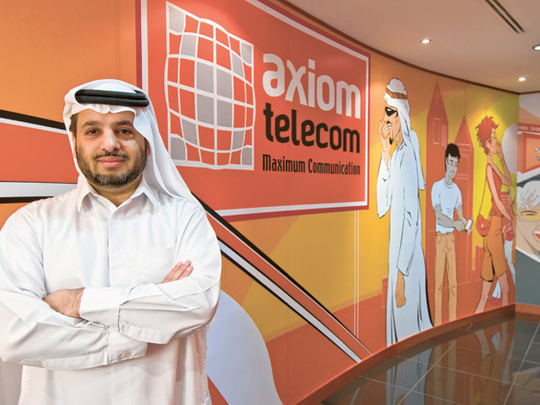
Dubai: Axiom's has been a homegrown success story driven in equal parts by strategy and innovation.
By continuing to invest in its retail, distribution and communications streams, the company has been able to withstand the downturn and emerge out of it with renewed momentum.
The partnership with du in the UAE and other leading operators across the GCC has created an extensive network coverage — to borrow a favoured phrase from the telecom industry — for Axiom.
In an interview with Gulf News, Faisal Abdul Aziz Al Bannai, CEO of Axiom, talks at some length on what strategies are being put in place to get on to the next level of substantial growth possibilities.
Gulf News: As the regional markets emerge from the downturn, where does Axiom stand in the region?
Faisal Abdul Aziz Al Bannai: Today we are the largest specialised retailer and distributor in the Mena (Middle East and North Africa) region in terms of size and reach. We cover 95 per cent of every independent shop in the UAE, and in Saudi Arabia, cover 40 per cent of the weighted distribution.
We have 600 plus stores in the GCC and cover approximately 2,700 independent retailers, plus 300 shops in India. In terms of outlets, the UAE is the largest followed by Saudi Arabia.
What kind of strategies were put in place to take Axiom to where it is today?
When we started in 1997, most of the company's operations were in trading and wholesale. I think the key turning point was in 2001 when we opened our retail channel.
To be a key player in this game we really needed to get close to the customer. Between 2001 and 2005 our turnover went from around Dh84 to Dh100 million to something close to Dh3 billion. We went through a massive growth spurt.
At that time most of mobile distributors were single brand. We made the strategic decision to become multi-brand and expand retail. This was the key characteristic between 2001 and 2005.
At the end of 2005, Tecom bought a 40 per cent stake and we realised that we needed to move to the next stage of our operation. In the next two to three years we upgraded the management team, our control systems and policies.
We work in a very fast-paced industry and investing in our back-end infrastructure was critical. We saw ourselves large in size, but wanted to diversify further.
During 2006 to 2008, we launched something called micro-distribution. We cut all the layers in our distribution system and went directly to small shops. It improved our margins and control.
The closer you are to a shop, the more you manage the supply chain. It worked well during the downturn because it helped some of these independent retailers who couldn't hold much inventory survive the crisis.
What are your expansion plans?
Across Qatar, Kuwait and Bahrain, we aim to open 20 more stores over the next 24 months. We have a lot of focus on driving more share in Saudi Arabia where we are the leading player in terms of size.
Apart from that, we're looking for more growth with operators. We are a key partner with du and do a lot of their activation. Du is currently seeing phenomenal growth and — we hope — we're contributing to that growth.
India for us is a very strategic location. It is still a very immature market in terms of retailers. We are partners with the Future Group, who through Pantaloon, have the largest retail network in India.











